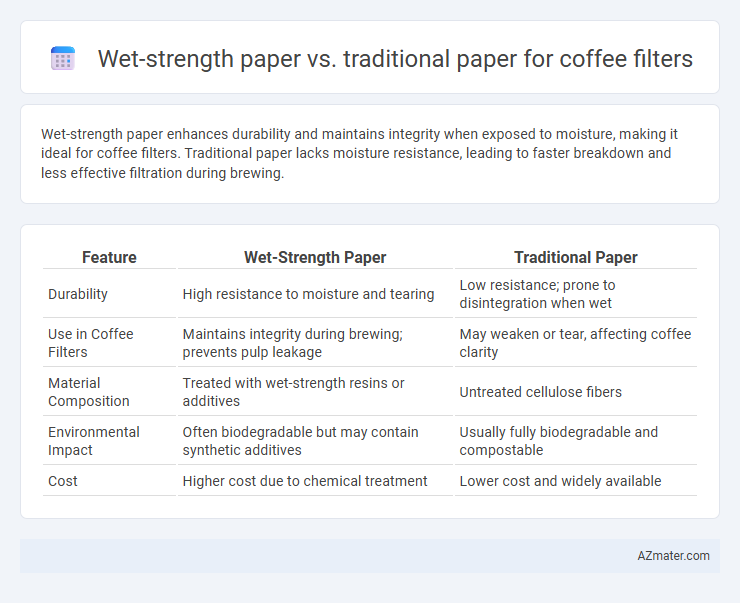Wet-strength paper enhances durability and maintains integrity when exposed to moisture, making it ideal for coffee filters. Traditional paper lacks moisture resistance, leading to faster breakdown and less effective filtration during brewing.
Table of Comparison
| Feature | Wet-Strength Paper | Traditional Paper |
|---|---|---|
| Durability | High resistance to moisture and tearing | Low resistance; prone to disintegration when wet |
| Use in Coffee Filters | Maintains integrity during brewing; prevents pulp leakage | May weaken or tear, affecting coffee clarity |
| Material Composition | Treated with wet-strength resins or additives | Untreated cellulose fibers |
| Environmental Impact | Often biodegradable but may contain synthetic additives | Usually fully biodegradable and compostable |
| Cost | Higher cost due to chemical treatment | Lower cost and widely available |
Introduction to Coffee Filter Paper Types
Coffee filter papers vary primarily between wet-strength and traditional types, each designed for specific brewing needs and durability. Wet-strength coffee filter paper is chemically treated to resist disintegration when exposed to moisture, ensuring better performance during prolonged brewing or immersion methods like cold brew. Traditional coffee filter paper, typically untreated and biodegradable, excels in drip coffee makers by allowing efficient water flow and optimal flavor extraction but may weaken if saturated for extended periods.
What is Wet-Strength Paper?
Wet-strength paper is specially treated paper designed to retain its strength and integrity when exposed to moisture, making it ideal for coffee filters that require durability during brewing. Unlike traditional paper, which weakens and disintegrates when wet, wet-strength paper incorporates synthetic resins such as polyamide-epichlorohydrin to enhance fiber bonding. This enhanced wet durability ensures consistent filtration performance and prevents tearing or sogginess, leading to a cleaner cup of coffee.
Understanding Traditional Paper Filters
Traditional paper filters for coffee are primarily made from wood pulp without chemical treatment, resulting in a biodegradable and eco-friendly option that effectively traps coffee grounds and oils for a clean cup. They often have a lower wet strength compared to wet-strength paper, which means they are prone to breaking or tearing when saturated, potentially causing sediment in the brew. These filters excel in filtering clarity but may require careful handling to prevent disintegration during brewing.
Manufacturing Processes Compared
Wet-strength paper for coffee filters is produced by incorporating wet-strength resins such as polyamide-epichlorohydrin during the pulp refining stage, enhancing fiber bonding and water resistance without compromising biodegradability. Traditional paper relies primarily on mechanical and chemical pulping methods, followed by drying and calendaring, which provide weaker tensile strength and are prone to disintegration when wet. The advanced manufacturing process of wet-strength paper involves higher precision in resin application and curing, resulting in durable, stain-resistant filters ideal for coffee brewing.
Performance in Brewing: Wet-Strength vs Traditional
Wet-strength paper offers superior durability and maintains its structural integrity when exposed to hot water during brewing, preventing tearing and loss of coffee grounds compared to traditional paper filters. This enhanced strength ensures consistent extraction and flavor clarity, as it minimizes the risk of paper pulp mixing with the brew. Traditional paper filters tend to weaken and disintegrate more easily, potentially leading to sediment in the cup and uneven brewing performance.
Strength and Durability Under Use
Wet-strength paper for coffee filters contains chemical additives that enhance fiber bonding, providing superior tensile strength and durability when exposed to hot water and prolonged brewing times. Traditional paper filters tend to weaken and tear more easily under moisture, leading to potential breakage and coffee grounds leakage. The enhanced wet-strength properties ensure consistent filtration performance and structural integrity throughout the brewing process.
Impact on Coffee Flavor and Clarity
Wet-strength paper maintains its integrity when exposed to hot water, preventing pulp fibers from breaking down and reducing unwanted paper taste in coffee. Traditional paper, lacking wet-strength properties, tends to disintegrate more easily, which may introduce off-flavors and sediment into the brew. Using wet-strength filters enhances coffee clarity by minimizing paper residue and preserving the natural flavor profile.
Environmental Sustainability and Disposal
Wet-strength paper used in coffee filters is engineered to resist disintegration when exposed to water, reducing the need for chemical additives and enhancing biodegradability compared to traditional paper filters that may contain more synthetic binders. Its environmental sustainability is elevated by the use of natural fibers and lower energy consumption during production, leading to decreased carbon footprint and easier composting after use. Disposal of wet-strength paper filters aligns with eco-friendly waste management practices, as they break down more efficiently in industrial composting systems, unlike traditional filters that may leave persistent residues or require landfill processing.
Cost Differences and Market Availability
Wet-strength paper for coffee filters typically costs 20-30% more than traditional paper due to its enhanced durability and resistance to moisture, which prevents tearing during brewing. Traditional paper is widely available in the market and caters to most standard coffee filter needs, making it a more cost-effective option for everyday consumers. The niche demand for wet-strength filters, driven by specialty coffee makers and commercial use, translates to limited availability and higher prices in most retail channels.
Choosing the Right Filter for Your Brew
Wet-strength paper coffee filters offer superior durability by resisting disintegration when exposed to hot water, ensuring a clean brew without paper residue, which is essential for maintaining coffee flavor purity. Traditional paper filters, while cost-effective and widely available, tend to weaken and may impart a papery taste or allow fine grounds to seep through, affecting the clarity and taste of your coffee. Selecting wet-strength filters enhances brewing consistency and flavor extraction, especially for longer or drip brewing methods where filter integrity is crucial.

Infographic: Wet-strength paper vs Traditional paper for Coffee filter
 azmater.com
azmater.com